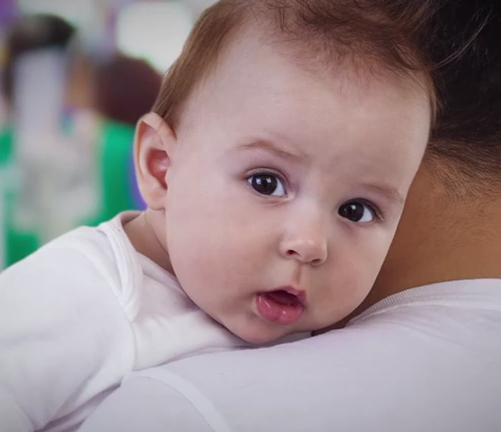(单词翻译:单击)
So you're in line at the grocery store,
你在杂货店排队,
and there's a parent holding a baby right in front of you.
前面有个家长抱着一个婴儿。
You're minding your own business, but when you look up,
你在做自己的事,但当你抬头时,
that baby just won't stop staring at you like you're the most interesting thing on the planet.
看到那个婴儿一直不停地盯着你,好像你是这个星球上最有趣的东西。
You might feel like you've grown a second head,
你可能会觉得自己长了第二颗脑袋,
or like you have chocolate smeared all over your mouth,
或者巧克力涂了满嘴,
but in reality, that baby just likes looking at your face.
但事实上,那个婴儿只是喜欢看你的脸。
Because there's a lot to figure out there!
因为脸上有很多要理解的东西!
From very early in life, babies seem to like looking at faces,
婴儿从非常小的时候就喜欢看人脸,
or even just configurations of shapes that look like faces.
或者看起来像脸的形状。
They also prefer faces they recognize to ones they don't,
他们也更喜欢看自己认识之人的脸,而不是陌生人的脸,
but they'll sometimes spend a little more time looking at strangers because they're new or different.
但他们有时会花更多的时间看陌生人,因为他们是新的或不同的。
Faces are important to babies
脸对婴儿很重要,
because they're basically completely helpless and have to rely on their caregivers to survive.
因为婴儿基本上是完全无助的,不得不依靠他们的看护人来生存。
They need to be able to find and communicate with the people who feed them and change their diapers,
他们需要能够找到喂养他们并给他们换尿布的人,并与后者交流,
and knowing what they look like is an important part of that.
所以知道看护人的长相很重要。
Even if said communication just involves screaming at the top of their lungs for a while.
即使交流也只是他们惊声尖叫一会儿。
Babies are also busy taking in huge amounts of information to help them understand the world,
婴儿们也忙于获取大量的信息来帮助自己了解这个世界,
and faces can teach them a lot.
而脸可以教会他们很多东西。
From our expressions to how our mouths form words,
从我们的表情到嘴如何说话,
a lot of our communication as humans happens through our faces.
人类的很多交流都是通过面部来进行的。
In those first few months of life,
在生命最初的几个月里,
babies are not only beginning to learn how to recognize their parents or grandparents,
婴儿不仅开始学习如何辨别他们的父母或祖父母,
but also about all the emotions conveyed by facial expressions. There's a lot to learn!
还学习面部表情传达的所有情感。要学的真多!
So when a baby is staring at you in the grocery store,
所以当一个婴儿在杂货店盯着你时,
her little brain is probably trying to figure if she knows you and what categories your face fits into,
她的小脑袋可能想确定她是否知道你,你的脸是什么类别,
like if you're happy or sad.
比如你是高兴还是悲伤。
Now, babies might be born ready to learn from the world around them,
婴儿可能生来就准备向周围世界学习,
but there's still some question about whether looking at faces is an innate characteristic,
但是对于看脸是否是一种与生俱来的特征仍存在一些疑问,
one you're born with, or if it's influenced by experience.
即你一出生就是这样的人,还是受了经验的影响。
And like with a lot of the age-old, nature versus nurture debate, it's a little bit of both.
就像很多由来已久的先天和后天辩论一样,它两者都占了一点儿。
On the nature side, there's some evidence that, within hours to days of being born,
在先天方面,有些证据表明,婴儿在出生数小时内,
babies can copy facial expressions they see, like if you stick out your tongue at them.
可以模仿他们看到的面部表情,比如你在他们面前伸舌头。
Not all studies agree with those results,
但不是所有的研究都同意这些结果,
but it's possible that there's an innate ability for finding and mimicking expressions.
婴儿有可能天生就有发现和模仿表情的能力。
Other research has found that within hours of birth,
其他研究发现,婴儿在出生数小时内
babies can discriminate between their mother's face and a stranger's,
可以区分出母亲和陌生人的脸,
which might mean their brain is ready to recognize faces without much information.
这可能意味着他们的大脑准备在没有太多信息的情况下识别人脸。
So, some evidence suggests that babies may be predisposed
因此,一些证据表明,婴儿可能有先天倾向
to look for information from faces right when they're born.
在出生后从面前的脸上寻找信息。

But other studies have shown that it takes experience to get really good at it.
但其他研究表明,要想真正做好它需要经验。
Either way, all the time babies and their caregivers spend looking at each other
不管怎样,婴儿和他们的看护人都一直看着对方,
causes rapid improvement in babies' abilities to process and recognize faces.
导致婴儿处理和识别人脸的能力迅速提高。
Starting around 3 months old, they even begin to group different kinds of faces,
婴儿从3个月大开始就给不同的面孔分组,
like human versus animals and kids versus adults.
比如人类和动物,儿童和成人。
One especially cool study had babies and adults look at a series of different monkey faces,
有一项特别有趣的研究,研究人员让婴儿和成人观看一系列不同的猴脸,
and also at a bunch of different adult human faces.
还有一堆不同的成人面孔。
They found that 6-month-old babies are actually better at differentiating between monkey faces than adults are!
他们发现,6个月大的婴儿实际上比成年人更擅长分辨猴脸。
But when they're about 9 months old, that ability goes away because of what's called perceptual narrowing,
但是当他们9个月大的时候,这种能力就消失了,原因是所谓的知觉变窄,
where their perception starts to change based on their experience.
即人们的感知根据经验开始改变。
Basically, the baby learns that paying attention to the differences in human faces
基本上,婴儿学会了注意人类面孔的差异
is way more important for its life than the differences in monkey faces,
比注意猴脸差异,对他们的生命来说更重要,
so it should focus more on humans than monkeys.
所以他们应该更多地关注人类,而不是猴子。
As the brain develops over time, the pathways used to recognize human faces get more efficient,
随着时间的推移,婴儿大脑识别人脸的途径变得更加有效,
and the ones for monkeys get pruned away.
而识别猴子的途径会被修剪掉。
But when researchers expose babies to lots of monkey faces between when they're 6 and 9 months old,
但是当研究人员把6个月到9个月大的婴儿暴露在大量猴子面前时,
they effectively teach their brains that monkeys are important to pay attention to,
他们可以有效地告诉大脑,猴子很重要,要注意,
so they keep that ability for a lot longer.
所以他们保持这种能力的时间更长。
Even though babies are born with some skills,
尽管婴儿天生就有一些技能,
experience helps tell them what parts of the world they should pay attention to,
但经验能帮助告诉他们应该关注世界的哪些地方,
and that shapes how their brain's perception and recognition systems develop.
并决定他们大脑的感知和识别系统如何发展。
So, it's a little bit of nature and a little bit of nurture
所以,既有一点儿先天因素,又有后天因素
that goes into that cute, big-eyed baby staring at you.
让那个可爱的大眼睛宝宝盯着你看。
And yeah, in that moment, your face might just be the most interesting thing on the planet.
是的,在那一刻,你的脸可能是地球上最有趣的东西。
But don't rule out the possibility that you might have a little chocolate on your face, too.
但也不要排除你脸上有巧克力的可能性。
Thanks for watching this episode of SciShow Psych,
感谢您收看本期的心理科学秀,
brought to you by our patrons on Patreon.
它是由Patreon赞助的。
If you'd like to help us keep exploring all the weird and wonderful things that happen in our brains,
如果你愿意帮助我们继续探索大脑中发生的所有奇怪或奇妙的事情,
you can go to patreon.com/scishow.
可以登录patreon.com/scishow。


